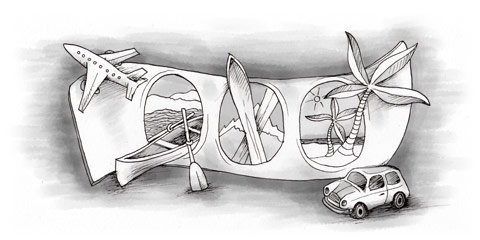For the addresses and telephone numbers of national sports associations contact Sport England (www.sportengland.org ) or the Central Council of Physical Recreation (www.ccpr.org.uk ).
- Archery – Archery is still a popular sport, many years after the British army was issued with more modern weapons. The UK is still searching for a modern Robin Hood who can win an elusive Olympic gold medal. Crossbow shooting is also practised in some clubs.
- Athletics – Most towns and villages have local athletics clubs and organise competitions and sports days. Competitive running has a strong following and jogging is also popular. Races, from fun runs of a few miles to half and full marathons are organised throughout the year, and all finishers in important races are awarded commemorative medals. The UK has a distinguished international record in athletics, particularly in middle-distance running, and top athletes now earn hundreds of thousands of pounds a year.
- Basketball – Basketball is becoming increasingly popular in the UK (there are over 1,000 clubs). Basketball doesn’t have a strong following as a professional sport, although the top teams participate in the European Clubs Championship.
- Bowls – Bowls has its origins in the 13th century and numbers Sir Francis Drake among its past enthusiasts. Once regarded mainly as a pastime for the elderly and retired, bowls is becoming increasingly popular with people of all ages, particularly the young (who are ruining the game’s image). In addition to outdoor greens, often provided in local council parks, there are also many private and indoor bowling clubs, including facilities in some leisure centres. Bowls isn’t to be confused with ten-pin bowling (see below). For a list of bowls clubs visit www.bowls-clubs.co.uk
- Boxing – Legalised punch-ups for violent types, boxing is popular throughout the country, particularly as a spectator ‘sport’ (many people enjoy watching a good fight, as long as they’re out of harm’s way). Most towns have a boxing club and gymnasia for budding professionals are common in the main cities. The UK has produced a stream of world champions over the years.
- Croquet – The UK’s answer to American football, except that all bodily contact is strictly forbidden (even tripping opponents with your mallet is frowned upon). An extremely genteel sport which is mandatory at English garden parties and unlikely ever to catch on among football hooligans.
- Darts – Not actually a sport, darts is an excuse to get drunk (have you ever seen anyone playing darts in a milk bar?). Around 5 million people play darts regularly in the UK (which dominates the world championship), usually in pubs, most of which have teams playing in local leagues.
- Fencing – Although fencing is a sport which has lost a lot of its popularity since the invention of the gun, a hard core of enthusiast swordsmen are holding out in a small number of clubs.
- Frisbee – Believe it or not, throwing plastic discs around has actually developed into a competitive ‘sport’, with national and local league and cup competitions.
- Gymnastics – Gymnastics is another popular sport, with most schools and sports centres having ‘gym’ clubs. Participation in sports centres costs from £1 to £5 a session.
- Hockey – Hockey is a very old sport in the UK and has gained wider appeal since Great Britain won the Olympic gold medal in Seoul in 1988, although it still faces an uphill battle to woo youngsters away from soccer, rugby and cricket. It’s equally popular among both sexes. Ice Hockey is becoming increasingly popular and if you fancy trying this sport out you can get skates from GoalieMonkey .
- Horse Racing – Watching horse racing is popular – not because the British are a nation of equestrians or horse lovers, but rather of inveterate gamblers. Horse racing is known as ‘the sport of kings’ and you certainly need a king’s ransom to buy and keep a horse in training. An extensive programme of events is organised throughout the year consisting of national hunt racing (steeplechasing and hurdles races), where horses must jump fences, from August to April and flat racing, in which there are no fences, from March to October.
- Horse Riding – Equestrianism is popular and needn’t be expensive unless you wish to own your own horse. There are around 2,300 riding schools in the UK, although many have closed in recent years owing to falling interest and increasing costs. It’s important to wear a helmet (and a back protector when riding cross-country courses), as people are killed and paralysed in riding accidents every year. The UK has a proud tradition of breeding and horsemanship and is one of the world’s leading show jumping nations.
- Lacrosse – Lacrosse is similar to hockey and although thought of as strictly a women’s game (whose training ground is the playing fields of the UK’s most exclusive private girls schools), lacrosse is played by men and women.
- Martial Arts – Unarmed combat ‘arts’ such as Aikido, Judo, Karate, Kung Fu, Kushido, Taekwon-Do and T’ai Chi Ch’uan are taught and practised in many leisure centres and clubs. Judo is the most popular martial art and a sport in which the UK has had considerable international success.
- Polo – Polo is a minority sport for princes and millionaires. Similar to croquet on horseback, it involves players attempting to hit a ball into a goal while riding at speeds of up to 40mph. It’s played indoors and outdoors. A modern variation for commoners is bicycle polo – the sport of princes from the seat of a pushbike.
- Rollerskating & Skateboarding – Rinks and specially designed circuits are provided in many towns for skateboarding. Children can start at around seven, but participants of all ages should be protected against falls with crash helmets and elbow and knee pads. It’s difficult to hire equipment, as it’s too easily stolen, although BMX bikes can usually be hired. The cost of using purpose-built facilities is around £2 to £5 (including the hire of a bike) or nearer £1 if you provide your own bike. Rollerskating rinks are widely available and are sometimes located in leisure centres. Skates can be hired, coaches are to hand, and roller-discos for teenagers are often organised. Inline skating – using skates on which the wheels are set in a line – was a craze for a while. It’s now less popular and its practice has been curbed on public paths due to the risks to cyclists and pedestrians (some of whom have been killed in collisions). Keen rollerskaters and inline skaters often play roller hockey.
- Shooting – Shooting clubs, whose members confine their sport almost exclusively to private ranges, are popular in the UK. The country does well in international competition. Clubs enforce strict rules regarding the handling and storage of firearms, which the general public aren’t usually permitted to store at home without a licence. Clay pigeon shooting is also popular among the well-heeled and costs around £200 to £250 a day.
- Tenpin Bowling – There are tenpin bowling centres in all major cities (around 100 with up to 48 lanes) and, after a decline in the ‘70s, the sport made a comeback at the end of the 20th century. A game costs around £2 for adults (but may be dearer in the evening), £1.50 for under-16s and £1 for shoe hire. Most centres are open from around 10am to midnight or later. There are tenpin bowling leagues and clubs everywhere and many companies have teams. Many centres have a restaurant, licensed bar, snack bar, nursery facilities, amusement machines and pool tables.
- Trampolining – Trampolining is a popular sport among high fliers and gymnasts with a large number of clubs (junior and senior) thriving around the UK. Courses are organised for all ages.
- Volleyball – Volleyball is a really fun game for all the family, deserving much wider popularity. It’s often played on beaches (beach volleyball).
- Weightlifting – There are weightlifting clubs in most large towns in the UK, many using the facilities of a local leisure centre or fitness club.
- Wrestling – This refers to the real sport of wrestling (as practised in the Olympics) rather than the cabaret stuff shown on TV. However, when it comes to mass popularity, showbiz wrestling is streets ahead.
Other Sports
Many foreign sports and pastimes have a group of expatriate fanatics in the UK, including American football, baseball, boccia, boules (and pétanque), Gaelic sports (hurling, Gaelic football), handball and softball. For information, enquire at council offices, libraries, Tourist Information Centres, expatriate social clubs, embassies and consulates.
This article is an extract from Living and working in Britain. Click here to get a copy now.


